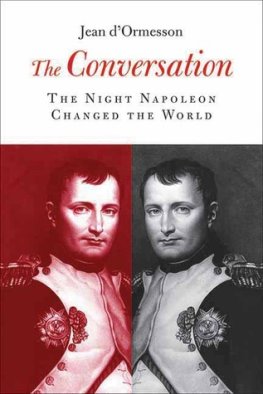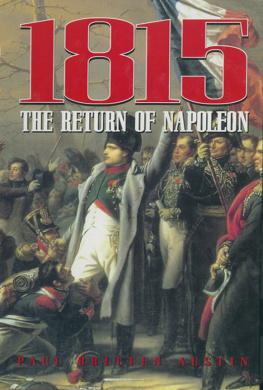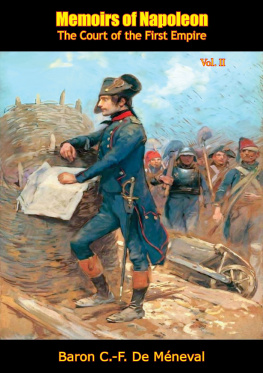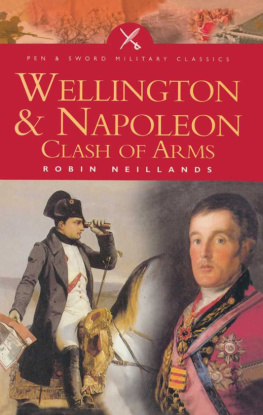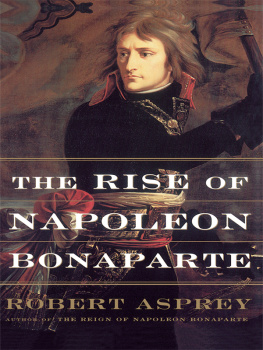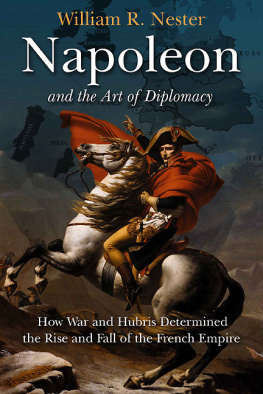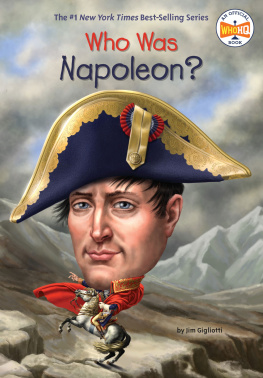THE MARCH
OF THE TWENTY-SIX
The Story of Napoleons Marshals
by
R. F. DELDERFIELD
PEN & SWORD MILITARY CLASSICS
First published in 1962 by Hodder & Stoughton.
Published in 2004, in this format, by
PEN & SWORD MILITARY CLASSICS
an imprint of
Pen & Sword Books Limited
47 Church Street
Barnsley
S. Yorkshire
S70 2AS
Copyright R. F. Delderfield, 1962, 2004
ISBN 1 84415 097 6
The right of R. F. Delderfield to be
identified as Author of this Work has
been asserted by him in accordance with
the Copyright, Designs and Patents Act 1988.
A CIP record for this book
is available from the British Library.
All rights reserved. No part of this book may be reproduced or
transmitted in any form or by any means, electronic or mechanical
including photocopying, recording or by any information storage a
nd retrieval system, without permission from the Publisher in writing.
Printed and bound in Great Britain by
CPI UK
For a complete list of Pen & Sword titles please contact:
PEN & SWORD BOOKS LIMITED
47 Church Street, Barnsley, South Yorkshire, S70 2AS, England.
E-mail: enquiries@pen-and-sword.co.uk
Website: www.pen-and-sword.co.uk
CONTENTS
Chapter
LIST OF ILLUSTRATIONS
Number
Dedicated to
LIEUT-GENERAL SIR BRIAN HORROCKS
K.C.B., K.B.E., D.S.O., M.C. LL.D. (HON.)
whose recent broadcasts have done so much to
present the military art to the man in the street.
R.F.D.
March 1961
The Empire founded by Napoleon I began in December 1804 and came to an end in June 1815. During this period a total of twenty-six fighting men were awarded the baton their chief claimed was concealed in the knapsack of every private soldier in the armies of France. But Napoleons control of France, and of a large part of Europe, was not limited to these eleven years. It had its beginning more than eight years earlier after his crop of astounding victories in Northern Italy and was finally established after his seizure of power during the coup dtat known as Brumaire, in November 1799.
The men who subsequently became marshals of the Empire were already holding high rank when Napoleon became head of the state, although almost all of them did, in fact, spring from humble origins and owed their first boost to the Revolution.
This is the story of twenty-six men who held a Continent in thrall for almost twenty years. I have tried to tell a story of personalities rather than of events. Histories of the era are written for the reader who is fairly familiar with the main sequence of occurrences and the leading figures who shaped them; to write simply another history of the First Empire is not the purpose of this book. It requires a lifetime of study to understand the impact Napoleon had upon his generation and upon the political pattern of Europe that followed his eclipse at Waterloo. This story is for the average reader who may want to know something more of the brave, ambitious men who sustained the weight of Napoleons thronehow they began, how they reacted to power, how they met their several ends, what kind of employers they seemed to the men who followed them and how they behaved to the man who had elevated them from stable boys and travelling salesmen to places in history where their names became legends in their own lifetime.
It would, of course, be quite impossible to tell the story of Napoleons marshals without giving a brief account of the battles and campaigns in which they were engaged over two decades, but all the time I have been at work upon this book I have kept in mind the fact that most readers of biography are more interested in people than in the ebb and flow of military conquests that took place a hundred and fifty years before the explosion of Hiroshima made this kind of warfare as old-fashioned as Caesars.
All that is necessary to follow this story is a map of Europe and the cast-list appended below. For the rest, I hope that these remarkable men will speak for themselves.
Here is the dramatis personae of the story:
Created marshals by Imperial decree, in 1804:
KELLERMAN | who began as a regular soldier with the rank of ensign. |
LEFBVRE | who began as a hussar. |
PRIGNON | who began as a grenadier. |
SRURIER | who began as a sub-lieutenant. |
BERTHIER | who was an engineer turned professional soldier. |
MURAT | an innkeepers son originally destined for the Church. |
MONCEY | who set out to become a lawyer. |
JOURDAN | a doctors son who walked the roads with a pedlars pack on his back. |
MASSNA | who had been cabin-boy, smuggler and fruit-seller before he became an officer. |
AUGEREAU | whose first wages were earned as a footman. |
BERNADOTTE | a lawyers son turned professional soldier who rose to be a sergeant-major. |
SOULT | who set his heart on becoming a village baker. |
BRUNE | who began studying law but always wanted to be a writer. |
LANNES | who began life as an apprentice dyer. |
MORTIER | the half-English son of a small farmer. |
NEY | who was set to work as a barrel cooper but ran away to become a hussar. |
DAVOUT | who entered the Royal army as a sub-lieutenant. |
BESSIRES | whose first job was that of a barber. |
In 1807 Napoleon began adding to this imposing list, promoting several high-ranking generals on their merits. The first addition was:
VICTOR | a revolutionary sergeant in the Royal army. |
In 1809 Napoleon gave three more men the baton. They were:
MACDONALD | the son of an exiled Scots clansman, who became an officer cadet at the age of 22. |
MARMONT | who began as an artillery cadet. |
OUDINOT | who thought of following his father in the brewery trade but joined the army when the Revolution broke out. |
Each year, from 1811 onwards until the fall of the Empire, Napoleon chose one more man to join the Marshalate. They were:
SUCHET | whose father was a silk-manufacturer. |
ST. CYR | who began life as a student of engineering and gave lessons in drawing to earn extra money. |
PONIATOWSKI | who was the nephew of a Polish Prince and followed the trade of arms all his life. |
During the brief Waterloo campaign one more man was given a marshals baton. He was:
GROUCHY | the son of a marquis, who enlisted as a volunteer on the side of the people when the Revolution began. |



